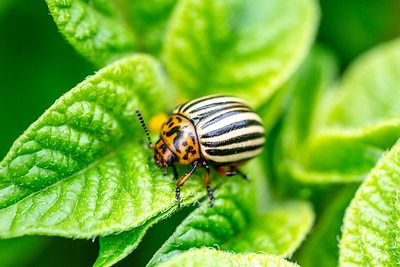
GM/Biotech Crops Report – February 2024
8th February 2024- GM/Biotech Crops Monthly Reports (BELOW) form part of BCPC’s free three-tier Biotech Crops Info service.
- This service also includes a weekly round-up of news from around the globe – see BCPC Newslink GM Crops section.
- Plus – Free access database on over 300 GM/biotech products covering 23 crops in the global market visit BCPC’s GM/Biotech Crops Manual – Register here for free access.
- Already registered? Click here
GM/Biotech Crops Monthly Report February 2024
New bioinsecticide for Colorado beetle in America
 A new bio-insecticide based on RNA technology has been given approval by the Environmental Protection Agency in America and has also been approved by several States. The active ingredient is ledprona and the product is called Calantha and the Insect Resistance Action Committee have created a new category for this mode of action (IRAC 35). It is foliar applied and when consumed by the beetle it stops feeding and dies from its own toxins. Pic: Marco Verch
A new bio-insecticide based on RNA technology has been given approval by the Environmental Protection Agency in America and has also been approved by several States. The active ingredient is ledprona and the product is called Calantha and the Insect Resistance Action Committee have created a new category for this mode of action (IRAC 35). It is foliar applied and when consumed by the beetle it stops feeding and dies from its own toxins. Pic: Marco Verch
Cloned monkeys
Scientists in China have successfully cloned rhesus monkeys in an effort to improve medical research. Previous attempts have been largely unsuccessful due to a failure to realise that the placenta needed to be modified to improve the chances of healthy individuals developing. This year will be 28 years since Dolly the cloned sheep was born.
New cancer cure
Blinatumomab is a new drug that trains the body’s immune system to recognise and destroy leukaemia cells in the blood. A boy for whom chemotherapy failed was given a back-pack which contained a reservoir of the drug and a small electric pump which allowed him to only visit the hospital every 4 days to receive top-ups. Besides being much kinder to the body than chemotherapy, the boy is now completely clear of cancer. It works in a similar way to CAR T treatment where cells are removed from the body, edited in the lab to recognise the cancer cells and then returned to the body but Blinatumomab is much cheaper.
Full Story.
Speed dating for rice
The International rice Research Institute has developed a process that it calls Speedflower. This can achieve 4 – 5 crops of rice per year and will dramatically speed up conventional breeding programmes.
Microbiome engineering for plants
Southampton University has engineered a microbiome for plants that can boost the health of crops and potentially reduce the need for pesticide application.
Improving cotton
The Chinese Academy of Agricultural Science has identified a gene in cotton that regulates yield and fibre quality. This knowledge will be used to improve the output of upland cotton varieties where growing conditions are more challenging.
Improving crop/soil microbe interaction
Researchers at Singapore University have discovered that a stress hormone in plants can also influence the connections between the plant roots and soil microbes. This ‘SOS’ signal from the plants boosts the nutrient supply by the microbes to the roots and can result in a 30% increase in yields.
Microalgae versus bacterial blight in rice
Scientists in India have discovered that the microalga Chlorella thermpohila has anti-microbial activity against bacterial blight in rice which, if uncontrolled, can reduce yields by up to 80%. This microalga can also be used to treat waste water.
Improved seed germination
Researchers at Taiwan University have discovered that water exposed to a cold atmospheric plasma discharge has higher levels of activated oxygen and nitrogen content. When used to germinate mungbeans this plasma-activated water (PAW) gives better germination and it is expected to have a similar effect on other seeds.
Stress tolerance in tomatoes
Tel Aviv University faculty of life science has used CRISPR-Cas9 editing to modify the ROP9 gene in tomatoes that influences stomata opening. The modified plants lose less water via these leaf pores but maintain CO2 uptake and produce the same amount and quality of fruit with no loss of sugar content in the fruit.
Temperature tolerance in wheat
Researchers at the John Innes Research Centre in Norwich have identified a gene that helps stabilise wheat fertility outside the optimum range of 17 – 23 °C. This knowledge is expected to make the identification of wheat varieties that can cope with future changeable weather patterns easier.
Yellow mottle virus resistance in rice
Using gene editing a team from Dusseldorf University and the French Institute for Sustainable Development have developed lines of rice that are resistant to yellow mottle virus, a disease that is particularly common amongst small-scale rice growers in Africa.
Bigger barley grains
Researchers that the Hungarian Agricultural University have used CRISPR-Cas9 editing to silence the GW”.1 gene in barley. The modified plants produce longer fatter grains with higher protein content but, unfortunately, it also reduces yield by limiting the number of grain sites on the ear. How to overcome this yield reduction is the next step requiring further funding.
Rice with better roots
Researchers in Taiwan have identified a gene in rice that promotes root development and, perhaps because of better roots, makes the crop more stress tolerant. This gene could be used as a marker to identify varieties that are better able to cope with abiotic stress.
Possible improvements in rice yield
The OsbZIP1 gene in rice affects the angle that the roots grow at and researchers in Japan have developed a variety called as 88N which shows increase nitrogen and phosphorus uptake over non-modified varieties. The increase in nutrient uptake may achieve higher yields but, because the roots grow at a shallower angle than standard plants, they may be more susceptible to stress and drought.
Potato blight resistance
Researchers at Wageningen University in Holland have found that silencing the StNLR1 gene in potatoes with CRISPR-Cas9 editing reduces the size of lesions caused by late blight (Phytophthera infestans) but unfortunately this modification makes the plants more susceptible to early blight (Altenaria). Perhaps more genes need to be edited.
Progress on gene-editing in Europe
On 24th Jan 2024 the European Parliament’s Environmental Committee approved a proposal for New Genomic Techniques (gene editing) by 47 votes to 31 against with 4 abstentions. It goes before the European Parliament on 6th Feb 2024. Fingers crossed!
Gene-edited maize in Europe
VIB in Europe has submitted a proposal for field testing a CRISPR-Cas9 edited maize that has less lignin in the cell walls. This is designed to make the crop more palatable to livestock when used as a feed.
THE LATEST ADDITIONS TO THE GM/BIOTECH DATABASE ARE:
- There are no additions to the database this month
FOR INSTANT ACCESS TO GM BIOTECH MANUAL CLICK HERE (Registration required)
Already Registered? Click here to access

